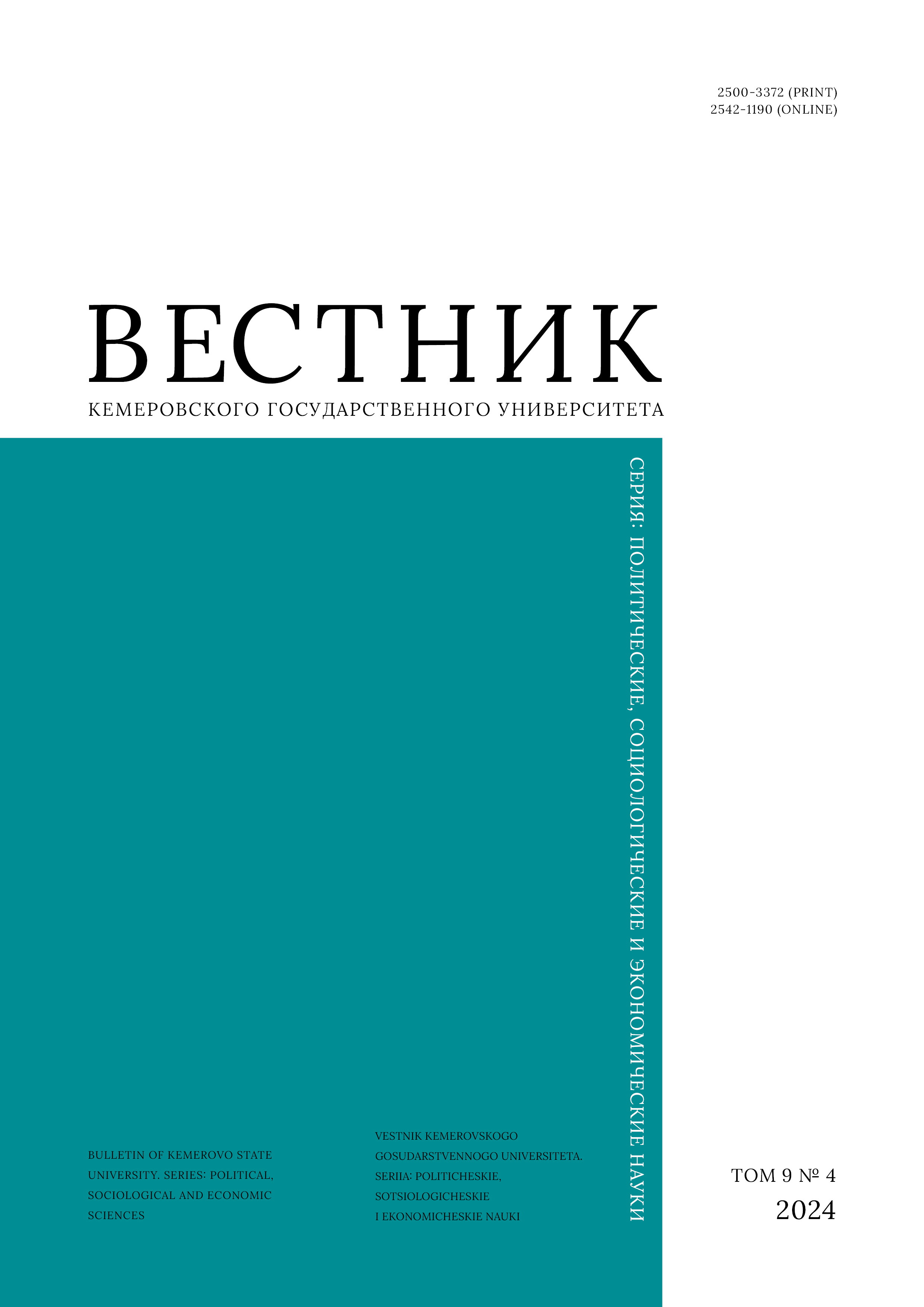Tomsk, Russian Federation
Tomsk, Russian Federation
The ontology of contemporary political reality is subjective, because it is an artificial national world that provides a vivid semantic reality in order to resist the deconstruction of political semantics. A nation is an imaginary construct that can be analyzed at two levels. Theoretical research covers some general characteristics of imaginary worlds and identifies them. Empirical level provides the symbolic practice of constructing imaginary political realities. The authors studied the example of Arab-Israeli antithetical representations to define the concept of imaginary political world, as well as to identify the semantic practices of constituting the national image. The study relied on the political-constructivist approach to reconstruct the nation as a narrative in order to identify the semantic structure of the imaginary world based on myths and heroic symbols applied as facts aka. constructs to a particular political reality. The authors came up with an idea of a modern nation reassembled as a new structure and an imaginary political reality renovated symbolically and axiologically as a result of a protracted legitimacy crisis. The new images of nations get incorporated in the communicative sphere of mediatized politics to become a new political reality.
imaginary world, image of the nation, political semantic world, mythological and heroic model of reality, construction of values
1. Geertz C. The interpretation of cultures. Moscow: ROSSPEN, 2004, 560. (In Russ.) https://elibrary.ru/qocqvp
2. Lotman Yu. M. Problems of "teaching culture" as its typological characteristic. In: Lotman Yu. M. Semiosphere. Articles on cultural typology. St. Petersburg: Iskusstvo-SPB, 2000, 417–425. (In Russ.)
3. Lotman Yu. M. Three text functions. In: Lotman Yu. M. Semiosphere. Inside the thinking worlds. Pt. 1. Text as a sense-generating device. St. Petersburg: Iskusstvo-SPB, 2000, 155–163. (In Russ.)
4. Le Goff J. The medieval world of the imaginary. Moscow: Progress, 2001, 440. (In Russ.)
5. Ricoeur P. Memory, history, oblivion. Moscow: Izd-vo gumanitarnoi literatury, 2004, 728. (In Russ.) EDN: https://elibrary.ru/QWGQRR
6. Bourdieu P. Social space and symbolic power. THESIS, 1993, (2): 137–150. (In Russ.)
7. Hubner K. The truth of myth. Moscow: Respublika, 1996, 448. (In Russ.) EDN: https://elibrary.ru/SAAFVF
8. Shcherbinina N. G. Mytho-heroic construction of political reality of Russia. Moscow: ROSSPEN, 2011, 285. (In Russ.) https://elibrary.ru/qonfmt
9. Schütz A. On Multiple Realities. In: Schütz A. Selected works: A world shining with meaning. Problems of the nature of social reality. Moscow: ROSSPEN, 2004, 401–455. (In Russ.)
10. Gurevich A. Ya. Lucien Febvre’s lessons. In: Febvre L. Fights for history. Moscow: Nauka, 1991, 501–541. (In Russ.)
11. Anderson B. Imagined communities. Reflections on the origin and spread of nationalism. Moscow: KANON-press-Ts; Kuchkovo pole, 2001, 288. (In Russ.)
12. Berger P., Luckmann T. The social construction of reality: A treatise in the sociology of knowledge. Moscow: Mosk. filos. fond, 1995, 323. (In Russ.)
13. Shcherbinina N. G. Political construction of reality. In: Political science. New lexicon, ed. Solovev A. I. Moscow: Aspekt Press, 2023, 50–61. (In Russ.) https://elibrary.ru/gszwig
14. Pushkaryova G. V. Ideas and values as a method of constructing symbolic space of the national identity. Polis. Political Studies, 2017, (5): 156–173. (In Russ.) https://doi.org/10.17976/jpps/2017.05.11 EDN: https://elibrary.ru/ZGSQLD
15. Rakityansky N. M. Mental studies of global political worlds. Moscow: MSU, 2020, 461. (In Russ.)
16. Vorobev V. P. Israel: State and Religion. Moscow Journal of International Law, 2002, (4): 133–160. (In Russ.) https://doi.org/10.24833/0869-0049-2002-4-133-160 EDN: https://elibrary.ru/AKSLCQ
17. Karasova T. A. The evolution of the major ideological and political aims of the Zionism in Israel. Vostok. Afro-aziatskie obshchestva: Istoriia i sovremennost, 2010, (6): 70–79. (In Russ.) https://elibrary.ru/neifef
18. Osherov M. E. Israeli political myths. Moscow: Algoritm, 2018, 210. (In Russ.)
19. Sand Sh. The invention of the Jewish people. Moscow: Eksmo, 2012, 544. (In Russ.) https://elibrary.ru/qpxmif
20. Kantor V. K. Russian revolution or belief in idols (reflections over the S. L. Frank book "Wreck of idols"). Voprosy filosofii, 2009, (1): 109–124. (In Russ.) https://elibrary.ru/jvtyor
21. Ben-Rafael E. Self-identification of various social groups in modern Israeli society. (In Russ.) URL: https://web.archive.org/web/20100427032044/http://hedir.openu.ac.il/kurs/politic/ben-rafael.htm (accessed 24 Aug 2024).
22. Peters J. From time immemorial: The origins of the Arab-Jewish conflict over Palestine. NY: Harper and Row, 1986, 601.
23. Krylov A. V., Morozov V. M. Formation of the Palestinian nation: main stages. Etnosotsium i mezhnatsionalnaia kultura, 2017, (3): 135–142. (In Russ.) https://elibrary.ru/yunsrr
24. Nemelshtein D. The essence of the Palestinian-Israeli conflict. Proza.ru, 2019. (In Russ.) URL: https://proza.ru/2019/10/13/720 (accessed 28 Aug 2024).
25. Rakityansky N. M. Experience of the conceptual analysis of Islamic mentality in the context of political psychology. Lomonosov Political Science Journal, 2012, (5): 53–71. (In Russ.) https://elibrary.ru/psznwl
26. Zviagelskaia I. The Palestinian-Israeli conflict: The value dimension. Perspektivy, 2010. (In Russ.) URL: https://www.perspektivy.info/book/palestino-izrailskij_konflikt_cennostnoje_izmerenije_2010-06-30.htm (accessed 12 Aug 2024).
27. Baulina I. M. Civil religion in Israel: From Begin to Netanyahu. Tomsk State University Journal of History, 2016, (2): 83–87. (In Russ.) https://doi.org/10.17223/19988613/40/13 EDN: https://elibrary.ru/VVBIGH

















